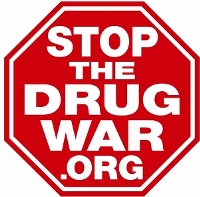Our first side event at the Human Rights Council in Geneva took place in early October, and featured supporters of the long-imprisoners Philippine Senator.
Two years on, Oregon's pioneering drug decriminalization is seeing arrests plummet and addiction services dollars explode. And he public likes it so far.
Some help for small pot producers may be on the way -- but first federal marijuana prohibition has to end.
An initiative to decriminalize DMT, ibogaine, mescaline, and psilocybin is on the ballot.
By the time voting ends in November, we could see half of all states embracing marijuana legalization.
An eight-year campaign to okay safe injection sites in the state comes to an abrupt -- though possibly temporary -- halt.
A Pennsylvania doctor who is also a medical marijuana patient is suing to be able to purchase a handgun, Oklahoma is prosecuting pregnant women who use medical marijuana, and more.
Indiana lawmakers will meet next week to hear a report on marijuana policy, Louisiana lawmakers have created a task force to look at employment protections for medical marijuana patients, and more.
Jockeying over marijuana reform legislation in Congress continues, the Oklahoma Supreme Court says a marijuana legalization initiative won't be on the November ballot but can be voted on later, and more.
Republicans seek political advantage by calling Mexican cartels "terrorist organizations," the FDA eases rules for groups distributing the opioid overdose reversal drug nalxone, and more.
Singapore arrests its citizens for doing drugs outside the country, Colombian President Petro's frank talk about the need for a new model drug policy is exciting critics, and more.
Pot prohibitionists are backing a marijuana research bill, the Philippine DEA says it is okay with medical marijuana, and more.
On Tuesday, October 4, 2022, we held our first side event at the UN Human Rights Council in Geneva. The event featured a statement by prerecorded video from Senator Risa Hontiveros of the Philippines. Father Albert Alejo, a leading human rights advocate from the Philippines who is currently based in Rome, hosted the event in person. Vicente de Lima, brother of imprisoned Philippine former Senator Leila de Lima, spoke live.
News coverage we know about:
Statement of Senator Hontiveros:
full event footage:
Human Rights in the Philippines: The Continuing Detention of Senator Leila de Lima
side event for the 51st Session of the UN Human Rights Council
Room XXV, United Nations Office at Geneva, and online
Tuesday 4 October 2022, 3-4pm CET / 9-10pm PHT / 9-10am ET
online via Zoom, registration at https:/stopthedrugwar.org/global/or https://us02web.zoom.us/meeting/register/tZMocOyupj4qE9INDq4OqGL71jsyyRFjvVIQ
live streaming on Facebook and YouTube
speakers:
Senator Risa Hontiveros, Republic of the Philippines (prerecorded video)
Vicente de Lima, brother of Leila de Lima
Father Albert Alejo, S.J., faculty at Pontifical Gregorian University, Rome
moderated by:
David Borden, Executive Director, DRCNet Foundation AKA StoptheDrugWar.org
Marco Perduca, Associazone Luca Coscioni and former Senator, Italy

The "Broken Chair," United Nations Office at Geneva
Last 24 February, Senator Leila de Lima marked five years of incarceration in the Philippines. Under the administration of recently-elected President Ferdinand Marcos Jr., de Lima remains jailed, despite not being convicted of a crime, and despite the recantations of three key accusers, who say they provided testimony because of pressure.
In the meanwhile, the extrajudicial drug war killings begun by former President Rodrigo Duterte continue. The Office of the Prosecutor (OTP) of the International Criminal Court, after pausing its investigation following a Duterte administration treaty motion, has sought court authorization to resume. But the Marcos administration has rejected the investigation and said it will not cooperate.
In "The Continuing Detention of Senator Leila de Lima," speakers will review her case, and the larger human rights situation in the Philippines.
This is a side event organized for the 51st session of the UN Human Rights Council. It is organized by DRCNet Foundation, a US-based NGO in consultative status with the UN Economic and Social Council, with cosponsor Associazone Luca Coscioni. Visit https://stopthedrugwar.org/globaland https://stopthedrugwar.org/philippines for information on our international programs. Email [email protected]or call +1 202-236-8620 for further information about this event.
-- END --
back to top
It has been nearly two years since Oregon voters approved Measure 110, a sweeping drug decriminalization and public health services funding initiative, and it still has strong public support. That could be because it is producing the kinds of results Oregonians want to see.

Measure 110 is bringing addiction recovery services not just to Portland, but to places like this, too. (Pixabay)
In voting for Measure 110, Oregonians sought to move the emphasis of drug policy from law enforcement to a public health approach, and that is what they are getting. Drug possession arrests, which had already dropped by half in 2020 because of the pandemic,
significantly decreased after Measure 110 took effect on February 1, 2021, according to data from the Oregon Criminal Justice Commission, falling another 65 percent from the 2020 levels in the first six months of 2022.
And Measure 110, which tapped into marijuana tax revenues to fund a broad spectrum of addiction services -- from low-barrier drug treatment and peer support and recovery to overdose prevention and housing and employment support (but not drug treatment covered by Medicaid or insurance) -- is setting the stage for a massive expansion of those services by pumping hundreds of millions of dollars into the field.
Late last month, the Oversight & Accountability Council, the body tasked with overseeing the distribution of the funding, approved the remainder of the initial $302 million made available under Measure 110, and on Tuesday, the Oregon Health Authority announced that it had finished awarding that money to more than 237 service providers in the form of grants.
With the state suffering more than a thousand overdose deaths in the past year, there is criticism that authorities have moved too slowly. Oregon Health Authority behavioral health director Steve Allen acknowledged as much, saying the agency had learned it needed to give more support and technical assistance to the volunteer committee tasked with grantmaking decisions.
"We understand the frustration this caused in our communities," Allen said. "When you do something for the first time you're going to make mistakes."
But now the money is out there, and it will help fund 237 service providers in 36 Behavioral Health Regional Networks (BHRNs), aimed at ensuring that help is available in even the most remote rural corners of the state. That includes 111 groups providing screening and behavioral health needs assessments, 112 groups doing individual intervention planning, 113 groups doing low-barrier drug treatment, 172 groups doing peer support and mentoring, 88 groups providing housing services, 84 groups providing harm reduction services, and 51 groups doing job support.
The money is going to allow these groups to expand their services by hiring and training new staff, securing additional facilities, buying vehicles for mobile support services, and even purchasing housing.
"Measure 110 changes the system so that there is no wrong door to access services," said Tera Hurst, Executive Director of the Health Justice Recovery Alliance. "Thanks to Measure 110, you don't have to get arrested before you are maybe offered help. Measure 110 is changing the addiction recovery service landscape so that regardless of the path, supportive services will be more readily available closer to home."
"It's been a long road, but we're ecstatic to see all of the Measure 110 funding for the 2021-2023 biennium finally being approved and going out to service providers to expand critical addiction services in Oregon communities. This is the first step in ensuring Oregon delivers on its promise of replacing a criminal legal approach to drugs with a public health approach and offering the rest of the country a glimpse of what is ultimately possible when we offer people support instead of punishment," said Kassandra Frederique, Executive Director of the Drug Policy Alliance, which was a key supporter of Measure 110 and which is partnering with the Health Justice Recovery Alliance on implementation.
Even with the slow rollout, Oregonians are liking what they are seeing. A poll released this month by Data for Progress found majority support for Measure 110 in every region of the state -- even the conservative eastern an southwestern areas -- and a strong bipartisan majority who agree that problematic drug use should be treated as a public health issue, not one for the criminal justice system.
When asked whether Measure 110 should remain in place, 58 percent said yes. That included 82 percent of Democrats and 56 percent of independents, but only 31 percent of Republicans.
The polling suggests that tying drug decriminalization to the expansion of recovery services is key to getting it over the finish line. When asked about individual components of the program, 91 percent supported peer mentoring, 90 percent supported employment help, 86 percent supported funding addiction recovery, 84 percent supported housing assistance, but only 62 percent supported harm reduction measures and only 61 percent supported decriminalization itself.
It is almost as if Oregonians made a bargain with themselves: Give us strong measures to aid recovery and we will grudgingly accept such vanguard measures as harm reduction and decriminalizing drugs. These pollsresults should send a clear message to people contemplating future decrim initiatives about how to broaden support for them.
back to top
It is tough times for the West Coast's small-time legal marijuana growers. In California, they are being battered by low prices, a tax and regulatory environment that favors larger operations, and a thriving black market. Next door in Oregon, small marijuana farmers are facing similar issues and are especially buffeted by falling wholesale prices. The pound of weed that earned an Oregon farmer $1,470 two years ago was going for $696 last month, a more than 50 percent decline since 2020.

paired small scale cannabis and commercial vegetable farm, Humboldt County, CA (https://calag.ucanr.edu)
Another obstacle small operators in both states face is being unable to sell their products outside of their own states. Since marijuana remains illegal under federal law, such sales are prohibited. But now, a pair of congressmen representing the two states have filed legislation that seeks to provide some help for beleaguered small growers by removing barriers to interstate sales.
On Wednesday, Reps. Jared Huffman (D-CA) and Earl Blumenauer (D-OR), founder and chair of the Congressional Cannabis Caucus, filed the Small and Homestead Independent Producers (SHIP) Act to allow small farmers and producers to operate across state lines -- once the end of federal marijuana prohibition is achieved. The bill specifically aims to support the smallest family farmers.
The bill says: "A small cultivator of marijuana and a small manufacturer of a marijuana product may ship and sell marijuana or a marijuana product to an individual located in that State or another State in which possession of marijuana or the marijuana product is lawful by that individual, using the Postal Service or any private or commercial 10 interstate carrier."
It defines "small cultivators of marijuana" as those growing less than one acre outdoors, 22,000 square feet of canopy in greenhouse operations, or 5,000 square feet of indoor canopy. "Small manufacturers of marijuana" are defined as those producers of edibles, tinctures, salves, or concentrates who gross less than $5 million per year.
"Too often, the federal government falls behind, and the gears of Congress work too slowly to keep up with the pace of a changing economy," said Representative Huffman in a press release announcing the bill. "Under my bill, folks in our state will be able to ship their products straight to consumers when the antiquated federal prohibition on cannabis is finally repealed. As large, commercial cannabis operations squeeze out local producers from the market, this legislation is critical for farmers to survive and expand their small businesses. We cannot leave our smallest family-farmers behind under full legalization."
Representatives of small growers said being able to sell direct to consumers would be a major benefit for them. The Origins Council, founded in 2019 to promote sustainable development within California's "legacy" marijuana growing regions and to promote appellations for such areas much like the ones adopted by the international wine industry, is on board.
"The direct-to-consumer model is a necessary resource for any small-scale craft-producing community that is deeply tied to the land on which it creates -- whether it produces wine, whiskey, cheese, beer, cannabis, or honey," said Genine Coleman, Executive Director of Origins Council. "The legacy cannabis community that has worked so long in the shadows should have the opportunity to join the ranks of other artisan producers across the United States and enjoy the privilege of connecting personally with their adult customers. As is always true with each step cannabis takes towards legality, the greater community stands to reap enormous benefit in the process."
So are groups representing small marijuana farms in Humboldt, Mendocino, and Trinity counties, California's original Golden Triangle.
"For small craft producers in nearly any context, direct-to-consumer shipping is the critical tool that enables a diversified market to survive and thrive. Cannabis is no different," said Ross Gordon, Policy Director of Humboldt County Growers Alliance (HCGA) and Policy Chair of The Origins Council. "The SHIP Act moves the conversation beyond the question of who can get a license to cultivate cannabis and addresses the practical reality of building an equitable and accessible market for small cannabis producers."
"As a legacy cannabis producer and family farmer located in the heart of the Emerald Triangle, I see the direct-to-consumer retail pathway as the only future of my small farm, and indeed -- of all rural communities like my own whose cultural heritage is rooted in craft cannabis cultivation and artisanal medicine making," said Karla Avila, owner and operator of Flowerdaze Farm in Trinity County and Executive Director of the Trinity County Agriculture Alliance.
The bill is also being endorsed in California by the Mendocino Cannabis Alliance, the Nevada County Cannabis Alliance, the Sonoma County Growers Alliance, and the Big Sur Farmers Association. Outside of California, it's supporters include the Massachusetts' Farm Bug Co-op, the Maine Craft Cannabis Association, the Vermont Growers Association, and the Washington Sun & Craft Growers Association.
But it is not going to happen until marijuana is legalized at the federal level, a prospect looking increasingly dim in this Congress. Whether progress comes in the next Congress will depend to a large degree on the results on November's mid-term elections. If the Democrats can hold the House and increase their numbers in the Senate, the odds are good. If not, not so much.
back to top
Beginning with the successful 2019 Denver municipal initiative that made possession of psilocybin mushrooms the lowest law enforcement priority, Colorado has been on the cutting edge of the psychedelic reform movement. This November, the state is poised to maintain that vanguard status by decriminalizing some psychedelics -- the natural ones.
That is because Natural Health Colorado has managed to get the Natural Medicine Health Act (Initiative 58) on the ballot. The measure has three main planks:
- It would decriminalize the personal use, possession, and cultivation by people 21 and over of dimethyltryptamine (DMT), ibogaine, mescaline (not derived from peyote), psilocybin, and psilocyn, as well as providing for the sealing of conviction records of people who have completed sentences for the use or possession of those substances. The measure sets no personal possession limits.
- It would create a "natural medicine services" program for the therapeutic administration of the specified psychedelics and create a rubric for regulated growth, distribution, and sales of those substances to entities within the program. Only psilocybin and psilocyin would be okayed for therapeutic use until 2026. Then regulators could decide on whether to allow the therapeutic use of DMT, ibogaine, and mescaline.
- It would create the Natural Medicine Advisory Board to create rules and regulations for implementing the therapeutic access program. The board could also make recommendations to the Department of Regulatory Agencies on adding additional substances.

psilocybin (Pixabay)
With the help of more than
$2.7 million in funding from the New Approach PAC, which has bankrolled numerous drug reform initiatives across the country, Natural Health Colorado zipped through signature-gathering in a quick three months and qualified for the ballot back in June.
A competing initiative campaign from Decriminalize Nature Colorado, which would have only decriminalized entheogens and not created a therapeutic program, failed to qualify for the ballot. Members of that group have since become some of the most outspoken critics of Initiative 58.
"I do not personally align with I-58 and the heavy out-of-state influence calling the shots in Colorado," said Melanie Rose Rodgers, co-proponent of the Decriminalize Nature initiative. "What happened with cannabis is happening with mushrooms. Folks from marginalized communities, People of Color are being left out -- once again. With all the inequality and rolling back of freedoms that exist today, let us not create new industries that will cater and serve the rich and wealthy while opening the floodgates for anyone able to buy Colorado 'healing center' licenses. I am opposed to the corporate takeover of sacred earth medicines and psychedelics written in I-58."
But Natural Health Colorado and its backers beg to differ, and they are emphasizing the therapeutic aspects of the measure.
"This initiative would give Coloradans access to a new, promising, and research-based treatment option for PTSD, depression, anxiety, and other mental health challenges, in a safe, careful, and beneficial way," said Kevin Matthews, an initiative spokesman who led the Denver psilocybin campaign. "These medicines can be transformative for people who have suffered for years and struggled to find help," he said.
"The Natural Medicine Health Act puts the well-being of patients and communities first," said Josh Kappel, chair of the Natural Medicine Colorado campaign. "It was purposefully designed, with a multi-phase implementation process that sets clear safety rules, while allowing the details of the regulatory structure to be developed by the community and regulators working together."
"Our goal is to make the healing benefits of these natural medicines available to people they can help, including veterans with PTSD, survivors of domestic or sexual abuse, people with treatment-resistant depression, and others for whom our typical mental-health treatments just aren't working," said Ben Unger, psychedelic program director for New Approach PAC.
The initiative is also being endorsed by David Bronner, CEO (Cosmic Engagement Officer) of Dr. Bronner's soaps. "I see what [Initiative 61] does as one seamless policy: making natural medicines -- psychedelic plant and fungal medicines containing psilocybin, DMT, ibogaine or mescaline (excepting peyote) -- available to all adult Coloradans in two powerful healing modalities: via a regulated access model in a therapeutic context; and the self-regulating community healing model in a decriminalized context," Bronner said.
Whether Initiative 61 can pass in November remains to be seen. Natural Health Colorado has said he has no internal polling for this year, but a poll last year had support for legalizing psilocybin at 50 percent. While the poll question was not an exact match with what the initiative offers, it is close, and the level of support suggests that the contest itself could be close. A rule of thumb among initiative campaigns is that they like to be at 60 percent when the final stretch commences, as it now has.
back to top
It is just a little over two months until Election Day, and the picture around marijuana legalization in the states is becoming clear. Six states -- Arkansas, Maryland, Missouri, North Dakota, Oklahoma, and South Dakota -- have seen initiative campaigns came up with sufficient signatures to qualify for the ballot, and if all of them succeed, that would bring the number of states where marijuana is legal to 25 -- half the states in the country.
But a couple of those states should come with asterisks: The Arkansas initiative will be voted on, but
the votes may not count as the state Supreme Court weighs whether to uphold the state election commission's decision not to certify the ballot title and popular names on the grounds that they are "misleading." And the Oklahoma initiative may be pushed back to a later special election or the next general election after delays in signature counting by a state contractor left it unable to be certified by the official deadline for the November ballot. The state Supreme Court is
currently considering whether to allow the initiative onto the ballot.
The Missouri initiative is also facing a legal challenge from prohibitionists, but that initiative is still on the ballot at this point, so no asterisk here.
Those caveats aside, here is a rundown of the legalization initiatives in the six states that could free the weed in November:
Arkansas
The Arkansas Adult Use Cannabis Amendment from Responsible Growth Arkansas would legalize the possession of up to an ounce of marijuana by people 21 and over and create a system of licensed marijuana cultivation, processing, distribution, and retail sales. It would also allow existing medical marijuana infrastructure (dispensaries, grow operations, etc.) to be integrated into the new adult use market. The Arkansas Beverage Control Board would be the regulatory agency.
Retail sales would face normal sales taxes plus an additional 10 percent tax. Fifteen percent of tax revenues would go to law enforcement, 10 percent to the University of Arkansas for Medical Sciences, five percent to fund drug courts, and the remainder to go into the general fund. There are no provisions for home cultivation or to promote social equity, although there is language deferring a criminal background check for people owning less than five percent of a marijuana business.
The most recent poll, from February, had support for legalization at 53.5%. That is a majority, but not a comfortable one.
Maryland
Question 4 would amend the state constitution by adding an article that allows people 21 and over to use and possess marijuana and providing that the General Assembly "shall provide for the use, distribution, possession, regulation and taxation of cannabis within the state."
This is an amendment that came not from the people but from the legislature, which passed it as House Bill 1 in April. The legislature that same month also passed implementing legislation to go into effect if the measure passes. The legislation, House Bill 837, which would set legal possession limits at 1.5 ounces and allow for the home cultivation of two plants. The bill would also automatically expunge convictions for conduct that would be legal if the measure passes.
The amendment contains no language about regulation or taxation. That will be left up to the legislature.
A March poll had support for legalization at a healthy 62 percent.
Missouri
Sponsored by Legalize Missouri 2022, Amendment 3 would allow people 21 and over to possess up to three ounces of marijuana and grow up to six flowering plants, as well as six immature plants and six clones. The measure also provides for the automatic expungement of nonviolent marijuana-related offenses.
The initiative also "seeks to broaden industry participation by small business owners and among disadvantaged populations, including those with limited capital, residents of high-poverty communities, service-disabled veterans, and those previously convicted of nonviolent marijuana offenses," according to Legalize Missouri 2022.
The initiative would tax retail sales at 6 percent, with localities allowed to add a 3 percent sales tax. It also gives cities and counties the option of disallowing retail sales via a popular vote.
It would also allow existing medical marijuana operations to seek recreational sales licenses beginning December 8, with regulators allowed up to 60 days to approve them, giving them an effective head-start on newcomer competitors.
The measure had drawn organized opposition from within the cannabis community, with critics saying it does not do enough to promote social equity, that it favors existing operators, and that because it is a constitutional amendment, the legislature would have little say. Still, despite the dissension, a July poll has support for legalization at a healthy 62 percent.
North Dakota
Sponsored by New Approach North Dakota, Initiated Statutory Measure No. 1 would allow people 21 and over to possess up to an ounce of marijuana, four grams of concentrates and infused products, and grow up to three plants at home, but not to consume it in public.
The measure includes specific child custody protections for parents who use marijuana in accord with state law, but employers could continue to prohibit marijuana use and there is no provision for expungement. New Approach North Dakota says it intends to address that in the legislature next year. The measure would also allow cities and counties to opt out of allowing marijuana businesses.
The initiative also creates a regulatory framework for commercial production and sales of marijuana with the Department of Health and Human Services (or a different agency designated by the legislature) developing rules and regulations and overseeing licensing of marijuana businesses. Regulators would have until October 1, 2023, to come up with rules for advertising, labeling, packaging, security, and testing standards.
There would be no new tax for marijuana, but the state's 5 percent retail sales tax would apply to marijuana sales. Those tax revenues are not designated for any particular fund. Commercial cultivators would have to pay an annual $110,000 registration fee and retailers would have to pay an annual $90,000 fee.
The number of retailers would be limited to 18 and the number of grow facilities limited to seven. In a bid to reduce monopolistic tendencies in the industry, no one person or entity could own more than one grow facility or four retail stores.
Just four years ago, state voters rejected a marijuana legalization initiative by a margin of 59 percent to 41 percent, but that was a more wide-open measure. There is no recent polling data for this measure.
Oklahoma
State Question 820 would legalize the possession, transport, and distribution of up to an ounce of marijuana, eight grams of concentrate, or eight grams of marijuana-infused products for people 21 and over. People would be allowed to grow up to six mature plants and six seedlings.
The Oklahoma Medical Marijuana Authority would be the regulatory agency for legal marijuana commerce, and retail marijuana sales would be taxed at 15 percent. Tax proceeds would go to the general fund (30 percent), public school programs (30 percent), drug treatment and overdose prevention programs (20 percent), the judicial revolving fund (10 percent), and municipalities or counties where marijuana is sold (10 percent).
The measure also would create a process for people to seek expungement of certain marijuana-related conviction or modification of sentences currently being served.
There is no recent polling on SQ 820.
South Dakota
Two years ago, voters approved a marijuana legalization initiative with 54 percent of the vote, only to see it thrown out in the state Supreme Court for violating the state's one-subject rule for initiatives. (It legalized marijuana and contained tax and regulatory provisions). Initiated Measure 27 seeks to get past that hurdle by not establishing a tax or regulatory structure for commercial sales. Instead, it would those issues for the legislature to decide.
It would legalize the possession, transport, and distribution of up to an ounce of marijuana by people 21 and over. It would also legalize the home cultivation of up to three plants -- but only in localities where there is no retail marijuana outlet, and there will not be any retail marijuana outlets unless and until the legislature acts to allow them.
An August poll had the initiative failing with only 44 percent of the vote, but that poll may be a fluke. It had support in the state's most liberal and populous region, the Sioux Falls metro area at only 38.6 percent. But in 2020, the Sioux falls metro area state Senate districts all reported at least 57 percent approval for legalization and one had the highest support of any district in the state at 72.7 percent. Maybe there has been a radical shift away from supporting legalization in two years, but most likely not.
As in the other five states, the real test comes on November 8.
back to top
Despite past comments that he was "very open" to allowing safe injection sites to operate in the state, California Gov. Gavin Newsom (D) on Monday vetoed a bill that would do just that, Senate Bill 57. He cited "concerns" about its implementation.

California Gov. Gavin Newsom (D) says he supports harm reduction but has "concerns." (gov.ca.gov)
Sponsored by Sen. Scott Wiener (D-San Francisco), the bill would have allowed for safe injection pilot programs in Los Angeles, Los Angeles County, Oakland, and San Francisco. In each of those jurisdictions, city councils or boards of supervisors had requested inclusion in the bill and were prepared to begin to implement the proven harm reduction intervention.
California embracing safe injection sites would have been a tremendous advance for harm reduction in the United States, where the first safe injection sites opened just months ago in New York City, and Rhode Island is the only other state to have okayed them. Such facilities have been operating for decades in Europe, Canada, and Australia and have a proven safety track record. At the 170 safe injection sites that have operated around the world, not a single overdose death has been reported. In New York City, in the first three months of operation, staff at these sites were able to halt over 150 overdoses.
The bill was supported by a broad coalition of organizations including the Drug Policy Alliance, San Francisco AIDS Foundation, California Society of Addiction Medicine, National Harm Reduction Coalition, Healthright 360, Tarzana Treatment Center, and the California Association of Alcohol & Drug Program Executives.
Support for the bill was also heightened by significant increases in drug use and overdoses since the beginning of the coronavirus pandemic. San Francisco saw a record number of overdose deaths in 2020, with 711 deaths in total. In 2021, 640 people died of overdoses, and the city is on track to exceed that number this year. Statewide, approximately 10,000 people died of drug overdoses from April 2020 to April 2021.
In his veto message, Gov. Newsom maintained that he has "long supported the cutting edge of harm reduction strategies," but was "acutely concerned about the operations of safe injection sites without strong, engaged local leadership and well-documented, vetted, and thoughtful operational and sustainability plans."
He also left open the possibility that he could support similar legislation in the future, saying "We should strive to ensure our innovative efforts are well planned, even when they start as pilots, to help mitigate the potential for unintended impacts. Therefore, I am instructing the Secretary of Health and Human Services to convene city and county officials to discuss minimum standards and best practices for safe and sustainable overdose prevention programs. I remain open to this discussion when those local officials come back to the legislature with recommendations for a truly limited pilot program -- with comprehensive plans for siting, operations, community partnerships, and fiscal sustainability that demonstrate how these programs will be run safely and effectively."
Sen. Wiener and his allies, however, were not assuaged by Newsom's leaving the door open for future action.
"Today, California lost a huge opportunity to address one of our most deadly problems: the dramatic escalation in drug overdose deaths. By rejecting a proven and extensively studied strategy to save lives and get people into treatment, this veto sends a powerful negative message that California is not committed to harm reduction," Wiener said in a statement Monday. "SB 57 is not a radical bill by any stretch of the imagination. It simply gives permission to cities -- each of which has requested that permission -- to pilot safe consumption sites and get people into treatment."
California risks being left in the lurch as other cities and states move to embrace the harm reduction intervention, he said.
"Other states and cities in the US are already moving forward with this proven health model. New York City, with the vocal support of Mayor Eric Adams, has successfully implemented safe consumption sites. Indeed, Mayor Adams is advocating to expand the sites to operate 24 hours a day, due to their success in reducing public drug use. Rhode Island passed a law authorizing safe consumption sites, and Massachusetts is moving in that direction. Philadelphia is on the verge of settling with the Biden administration to potentially allow it to open safe consumption sites consistent with federal law," Wiener said.
"Today's veto is tragic," Wiener continued. "For eight years, a broad coalition has worked to pass this life-saving legislation. Each year this legislation is delayed, more people die of drug overdoses -- two per day in San Francisco alone. While this veto is a major setback for the effort to save lives and connect people to treatment, we must not -- and will not -- let it end this movement. We'll continue to fight for an end to the War on Drugs and a focus on drug use and addiction as the health issues they are."
Wiener's allies in the coalition pushing for safe injection sites were equally appalled by Newsom's veto.
"We are incredibly disappointed and heartbroken that Gov. Newsom has put his own political ambitions ahead of saving thousands of lives and vetoed this critical legislation," said Jeannette Zanipatin, California state director for the Drug Policy Alliance, which sponsored the bill. "Despite the governor's remarks, LA, San Francisco and Oakland have already designated this a priority by authorizing the programs locally and have been standing ready to implement them quickly. We have already engaged local stakeholders in a robust process and they have taken active steps towards implementation in order to be part of the pilot SB 57 would have put in place. We don't need additional processes. What we need is action. Without action, people are going to die," she said.
"While Newsom plays on the fears that an 'unlimited' number of Overdose Prevention Programs could have been opened, this would have been a limited pilot program that was only for five years and three jurisdictions, with an extremely thorough evaluation process. In 2021 alone, California lost over 10,000 residents to the overdose crisis, and we are continuing to see it disproportionately claim the lives of people of color throughout the state. Make no mistake, these deaths are 100 percent avoidable through common-sense, cost-effective measures, like SB 57, but because of his veto, people will continue to die alone and in the shadows."
"Harm reduction programs in three California cities were poised and ready to implement overdose prevention programs. Oakland, Los Angeles and San Francisco have done the groundwork, have local support, and this veto leaves entire communities of people who use drugs, the majority of them unhoused, without an essential lifesaving tool," said Laura Guzman, senior director of Capacity Building and Community Mobilization at the National Harm Reduction Coalition. "Newsom's veto of SB 57 comes at a time when we lose over 10,000 Californians every year to overdose and have skyrocketing racial disparities in deaths. This veto is completely unjustified."
"We are outraged that Governor Newsom has vetoed SB 57," said Tyler TerMeer, PhD, CEO of San Francisco AIDS Foundation. "Given the number of fatal overdoses that continue to happen every day in San Francisco and across California, now is the time for us to take bold action in establishing lifesaving overdose prevention programs. We are sending an urgent message to our elected officials that preventing these programs from operating will cost lives."
The coalition formed to pass SB 57 isn't going anywhere, and this fight is far from over. Look for renewed efforts on both the legislative and consultative fronts to make California safe injection sites a reality.
back to top
A Pennsylvania doctor who is also a medical marijuana patient is suing to be able to purchase a handgun, Oklahoma is prosecuting pregnant women who use medical marijuana, and more.
LouisianaLouisiana Lawmakers Create Medical Marijuana Task Force. Lawmakers have created a special task force on medical marijuana with a special emphasis on ways to prevent employment discrimination against medical marijuana patients. The task force will also examine options for drug testing workers who use the drug. The task force's first meeting in set for a week from today.
New York
New York Regulators Set Rules for Medical Marijuana Home Cultivation. The state's Cannabis Control Board on Tuesday adopted regulations for home grows for medical marijuana patients, opening the way for home cultivation to get underway. Under the regulations, patients can grow up to six plants and caregivers, who can grow for up to four patients, can grow up to 12 plants. The regulations specify that landlords cannot penalize or refuse to lease to patients who grow their own. The regulations came after a public comment period where some advocates argued for higher plant limits to no avail. The board also approved conditional licenses for 19 cultivators and 10 processors.
Oklahoma
Oklahoma Is Arresting Pregnant Women for Using Marijuana. At least 26 women have been charged with felony child neglect since 2019 for using medical marijuana. That offense carries a sentence of up to life in prison, although defendants have typically pleaded guilty and received probation. At least eight of those women were registered medical marijuana patients. According to National Advocates for Pregnant Women, this is the only state to prosecute pregnant women for medical marijuana use. The prosecutions involving medical marijuana are "inconsistent with state law," said Ryan Kiesel, a civil rights attorney and former Oklahoma lawmaker. "Those women are protected as medical marijuana patients under the law," Kiesel said. "It's important to remember, if you have a medical marijuana license, you are under the care of a physician."
Pennsylvania
Pennsylvania Doctor Who Is Medical Marijuana Patient Sues ATF, FBI After Being Denied Right to Purchase Handgun. Dr. Matthew Roman, a registered medical marijuana patient, was turned down for a handgun purchase after truthfully telling the clerk that he had a medical marijuana card. The clerk, in compliance with federal law, refused to make the sale. Roman has now filed a federal lawsuit against the ATF and the FBI. In 2011, ATF issued a statement clarifying that a 1968 law barring anyone who uses an "unlawful" substance indeed applies to medical marijuana users even in states where it is legal. Roman's suit argues that "this strict, rigid, blanket prohibition violates the fundamental constitutional rights of tens of thousands of nonviolent, law-abiding citizens, and thus violates the Second and Fifth Amendments of the Constitution." In 2016, the 9th US Circuit Court of Appeals ruled against the plaintiff in a similar case.
back to top
Indiana lawmakers will meet next week to hear a report on marijuana policy, Louisiana lawmakers have created a task force to look at employment protections for medical marijuana patients, and more.
Marijuana PolicyState Treasures Reaffirm Support for Federal Marijuana Banking Reform at Annual Meeting. The National Association of State Treasurers (NAST) has reaffirmed its support for a resolution that calls on Congress to pass legislation to provide access to banks for the state-legal marijuana industry. The move came at its annual meeting Monday. The resolution says the NAST does not take a position on marijuana legalization but does back legislation to ease the industry's banking problems. The group cites the "ongoing conflict between states' laws legalizing cannabis and current federal laws, resulting in the vast majority of financial institutions refusing to provide banking services to legal cannabis businesses." Leaving the industry without access to banking services is "inefficient, expensive, and opaque, making illicit activity more difficult to track and posing a significant risk to public safety by increasing the likelihood of violent crime." The resolution comes as pressure mounts to pass the Secure and Fair Enforcement (SAFE) Banking Act, which has repeatedly passed the House only to be stalled in the Senate by Majority Leader Chuck Schumer (D-NY), who continues to hold out for a full-fledged marijuana legalization bill.
Indiana Lawmakers to Meet Next Week to Hear Report on Marijuana Policy. Lawmakers will gather on Tuesday for the presentation of a study by a Public Health Summer Study Committee on the potential health benefits, decriminalization and consequences of Delta-8, Delta-9 and other THC products over the last few months. The study was promoted by reform advocates, who hope it will help lay the basis for medical marijuana and/or recreational marijuana legalization. The state Prosecuting Attorneys Council, which opposes both medical and recreational marijuana legalization, will also be present at the capitol to plead its case.
Medical Marijuana
Louisiana Lawmakers Create Medical Marijuana Task Force. Lawmakers have created a special task force on medical marijuana with a special emphasis on ways to prevent employment discrimination against medical marijuana patients. The task force will also examine options for drug testing workers who use the drug. The task force's first meeting in set for a week from today.
New York Regulators Set Rules for Medical Marijuana Home Cultivation. The state's Cannabis Control Board on Tuesday adopted regulations for home grows for medical marijuana patients, opening the way for home cultivation to get underway. Under the regulations, patients can grow up to six plants and caregivers, who can grow for up to four patients, can grow up to 12 plants. The regulations specify that landlords cannot penalize or refuse to lease to patients who grow their own. The regulations came after a public comment period where some advocates argued for higher plant limits to no avail. The board also approved conditional licenses for 19 cultivators and 10 processors.
back to top
Jockeying over marijuana reform legislation in Congress continues, the Oklahoma Supreme Court says a marijuana legalization initiative won't be on the November ballot but can be voted on later, and more.

Marijuana remains a hot topic on Capitol Hill. (Creative Commons)
House Marijuana Banking Bill Sponsor Says Schumer Reaffirms Commitment to Passing It. Rep. Ed Perlmutter (D-CO), the House sponsor of the Secure and Fair Enforcement (SAFE) Banking Act (HR 1996) says he spoke recently with Senate Majority Leader Chuck Schumer (D-NY) about passage of his bill in the upper chamber and Schumer said he is "working on it" and is "going to get going" on the measure. "Whether that was just lip service or reality, there is momentum," said Perlmutter. "We're going to get this done. It probably won't happen until the lame duck session after the elections, but I've always felt confident that commonsense will prevail and we'll get this finished, and I think we will." The SAFE Banking Act has repeatedly been passed by the House, only to have consideration in the Senate blocked by Schumer, who has been holding out for a comprehensive marijuana legalization bill. But that bill is now not expected to move this session because it does not appear to have 60 votes in the Senate to get past a Republican filibuster.
House Judiciary Committee Approves Criminal Justice Bills, Including Sealing Records of Federal Marijuana Offenses. The committee led by Rep. Jerrold Nadler (D-NY) has approved a number of criminal justice measures, including bipartisan proposals to expunge records for prior federal marijuana offenses (HR 2864), provide funds for states that create systems of automatic expungements (HR 5651) and write into law retroactive relief for people imprisoned because of the crack/powder cocaine sentencing disparity (HR 5455). The move comes as expectations increase that the Senate will soon see a package of modest marijuana reforms after prospects for the passage of a comprehensive marijuana legalization bill sponsored by Majority Leader Chuck Schumer (D-NY) fade.
Oklahoma Supreme Court Keeps Marijuana Legalization Initiative Off November Ballot. The state Supreme Court ruled Wednesday that the State Question 820 marijuana legalization initiative will not be on the November ballot. The court held that it could not be printed on ballot in time to comply with the deadline for mailing them to voters. The initiative met signature-gathering requirements, but got bogged down by a new state law requiring state officials to verify signatures in addition to counting them. But the initiative will eventually go before the electorate. The question "will be voted upon by the people of Oklahoma, albeit either at the next general election following November 8, 2022, or at a special election set by the Governor or Legislature," the court ruled.
back to top
Republicans seek political advantage by calling Mexican cartels "terrorist organizations," the FDA eases rules for groups distributing the opioid overdose reversal drug nalxone, and more.

Colorado magic mushroom proponents have an uphill fight ahead of them, a new poll suggests. (Greenoid/Flickr)
Arkansas Supreme Court Okays Marijuana Legalization Initiative for November Ballot. The state Supreme Court on Thursday held that the Responsible Growth Arkansas marijuana legalization initiative will be counted after all. The move comes after the Board of Election Commissioners ruled that the measure's ballot title was misleading, but the high court disagreed, holding that "initiative power lies at the heart of our democratic institutions" and that the board and prohibitionist groups who had intervened in the case "have not met their burden of proving that the ballot title is insufficient."
Psychedelics
Colorado Poll Has Psilocybin Initiative Trailing. A new poll has the magic mushroom decriminalization initiative, Proposition 122, well south of the 50 percent plus one votes needed to pass in November. The Fox 31/Chennel2/Emerson College/The Hill poll had only 36 percent supporting the measure, with 41 percent opposed and 23 percent undecided. While the large number of undecideds leaves room for hope, they would have to break pretty decisively in favor of the initiative for it to get over the top. Only Democrats favored the initiative (53 percent), while 61 percent of Republicans opposed it. Two racial/ethnic groups emerge as opponents: 64 percent of Blacks oppose it, as do 63 percent of multiracial voters.
Harm Reduction
Opioid Reversal Drug Access to Ease Under Relaxed FDA Rules. The Food & Drug Administration (FDA) announced Thursday that harm reduction programs distributing the opioid overdose reversal drug naloxone will not have to comply with certain federal product tracing requirements. The agency said it would not enforce certain Drug Supply Chain Security Act requirements on programs that are distributing the drug to at-risk communities while an opioid public health emergency exists. "Combating the opioid overdose epidemic is an urgent public health priority for FDA," the agency wrote in the guidance. The FDA "is committed to advancing solutions to reduce opioid overdose deaths in the United States, including by supporting efforts to increase public availability of and access to naloxone."
Foreign Policy
GOP Senators File Bill Designating Drug Cartels as Terrorist Organization. Sens. Roger Marshall (R-KS) and Rick Scott (R-FL) filed a bill Tuesday to formally designate Mexican drug cartels as foreign terrorist organizations. The Drug Cartel Terrorist Designation Act. "The illicit drugs and other deadly activities being carried out by cartels are killing Americans at record rates. Since Joe Biden and the Democrats continue to turn a blind eye, we are going to do something about it by designating the drug cartels as Foreign Terrorist Organizations," said Sen. Marshall. "As these cartels continue to invade our porous southern border in an increasingly militarized approach, this designation is needed to ramp up our efforts to combat them. We will not rest in our fight to stop fentanyl's terrible scourge wreaking havoc in Kansas and across the US." Nonetheless, Mexican cartels are not foreign terrorist organizations; they are drug trafficking organizations.
GOP Texas Governor Designates Mexican Cartels as Terrorist Organizations. Gov. Gregg Abbott issued an executive order Tuesday that designated specified Mexican drug cartels as foreign terrorist organizations, although since Texas does not set US foreign policy it is not clear just exactly what that means. The order instructs the state Department of Public Safety (DPS) "to take immediate action to keep Texans safe amid the growing national fentanyl crisis." Abbott also directed DPS to identify Texas gangs that support the cartels and seize their assets.
back to top
Singapore arrests its citizens for doing drugs outside the country, Colombian President Petro's frank talk about the need for a new model drug policy is activating critics, and more.

Cocaine prohibiion is getting some renewed attention these days. (Pixabay)
Pair of GOP Senators Question Colombian President's Commitment to Cooperating with US on Drugs. Senators Charles Grassley (R-IA) and Marco Rubio (R-FL) have sent a letter to Dr. Rahul Gupta, Director of the White House Office of National Drug Control Policy (ONCDP -- the drug czar's office), expressing their concerns with Colombian President Gustavo Petro's drug policy changes and intentions to modify extradition policy with the United States. They are upset that Petro has initiated peace talks with the National Liberation Army (ELN), which they specify is "a left-wing Foreign Terrorist Organization" and that he has resumed diplomatic relations with neighboring Venezuela, or "the Maduro narco-regime," as they put it.
"Petro's favorable actions toward actors working closely with drug traffickers in our hemisphere call into question the Colombian president's commitment to cooperating with the United States to prevent the flow of drugs crossing our border," they charged. They also took issue with Petro's proposal to limit extradition to people who refused to cooperate with the Colombian state, saying it "incentivizes criminals to avoid extradition by bribing or coercing the sitting political regime."
The Colombian president has vocally called for an end to the US's current drug policy in Colombia and his government is considering -- but has not yet enacted -- significant drug policy reforms, such as decriminalizing small-scale coca production.
Colombia Ex-President Warns Petro's Call to Change Course in Drug War Could Make Country a "Narco-State." Ivan Duque, the rightist predecessor to current Colombian President Gustavo Petro, has warned that Petro's call to make a radical change in the war on drugs could turn the country into a "narco-state" that could threaten the security of the US and other countries in the region.
"Now, what worries me is that there is now the possibility of getting into the permission, or the legalization of cocaine and consumption," said Duque. "I think that it will be very bad for Colombia and that will be very bad for the countries in the hemisphere, and I think that could generate also a major security threat to the United States. So by no means I'm in favor of the legalization of the cocaine trade… But I also have to say it, Colombia cannot turn into a narco state. I think the world now has unified in the concept of prohibition, and I think if just one country, let's say Colombia, decides to legalize cocaine, it'll turn itself into a narco state."
The Petro government has so far rejected cocaine legalization, but it is considering the decriminalization of small-scale peasant coca cultivation.
International
Belgian Prime Minister Condemns Threats Against Justice Minister from Drug Traffickers. Belgian Prime Minister Alexander De Croo on Saturday condemned serious threats against the country's justice minister as "totally unacceptable" after a car containing firearms was found near his home. Belgian media says the threats could involve kidnapping by drug traffickers, who have been angered by a recent ramping up of Belgian enforcement activity after an unprecedented flare-up of violence among traffickers this summer. Belgium and the neighboring Netherlands are the main European hubs for cocaine trafficking, with 90 tons of the drug being seized in the Belgian port of Antwerp last year.
Singapore Arrests Citizens for Using Drugs in Other Countries. The city-state's Central Narcotics Bureau announced Saturday that authorities had arrested 41 citizens so far this year for using drugs outside the country. Under Singaporean law, citizens who use drugs outside the country face the same punishment as those caught using drugs inside the country. A first offense can garner up to 10 years in prison, but most people charged with the crime are sent to rehabilitation if there are no other charges against them. The policy is in line with the city-state's draconian drug policies, which include the death penalty for trafficking as little as 15 grams of heroin or 500 grams of marijuana.
back to top
Pot prohibitionists are backing a marijuana research bill, the Philippine DEA says it is okay with medical marijuana, and more.

Washington, DC (Creative Commons)
Pot Prohibitionists Get Behind Effort to Pass Federal Marijuana Research Bill. As the Senate turns toward considering marijuana banking reforms in the form of the Secure and Fair Enforcement (SAFE) Banking or a SAFE Plus bill, researchers associated with the prohibitionist group Smart Approaches to Marijuana (SAM) are instead urging Majority Leader Chuck Schumer (D-NY) to move on a bill that would greatly expand marijuana research. The House has already passed the Medical Marijuana and Cannabidiol Research Expansion Act (HR8454), but the bill has seen no action in the Senate. The SAFE Banking Act Plus includes a marijuana research provision, but the SAM researchers want to see the standalone bill passed instead, saying it was "vital" to pass it because marijuana use rates are rising.
DC Voters Support Marijuana Legalization, Oppose Crackdown on Gifting Grey Market, Poll Finds. Eight years after voters in the District of Columbia approved marijuana legalization, they still approve, a new poll finds. The poll from Brilliant Corners Research & Strategies found support for legalization at 72 percent. While DC legalized pot, it has been barred from implementing legal recreational sales by Congress, resulting in a thriving grey "gifting" market. DC residents want a regulated market, not a crackdown, the poll found, with 76 percent supporting a regulated market and only 19 percent supporting shutting down the informal market.
Medical Marijuana
New Mexico Patient Plans to Sue Feds Over Raid on Tribal Land. Pueblo of Picuris tribal member Charles Farden is preparing to sue the Bureau of Indian Affairs (BIA) over a raid on his medical marijuana garden on tribal land last year. The raid destroyed nine plants he was growing. Now, he has filed a tort claim indicating he intends to sue the federal government, charging that the raid was carried out without a warrant and that it unveiled a federal double standard that discriminates against Native people. A congressional rider blocks the Justice Department from interfering in state-legal medical marijuana programs, but no such rider applies to the BIA, leading Native people uniquely vulnerable to federal marijuana efforts.
International
Philippine DEA Not Opposed to Medical Marijuana. The Philippine Drug Enforcement Agency (DEA) is ready to legalize medical marijuana, its director, Wilkins Villanueva, told a Senate committee hearing. But the island nation's other drug control body, the Dangerous Drug Board, said its position would be determined by its member health experts. "We have members from the Department of Health who are experts in these medical matters, so we defer to the position and recommendation of the DOH and the Philippine Medical Association," the board said. Medical marijuana is currently available for "compassionate use," but only at great expense. A bill to make medical marijuana available to all who need it is currently pending in the legislature.
back to top











